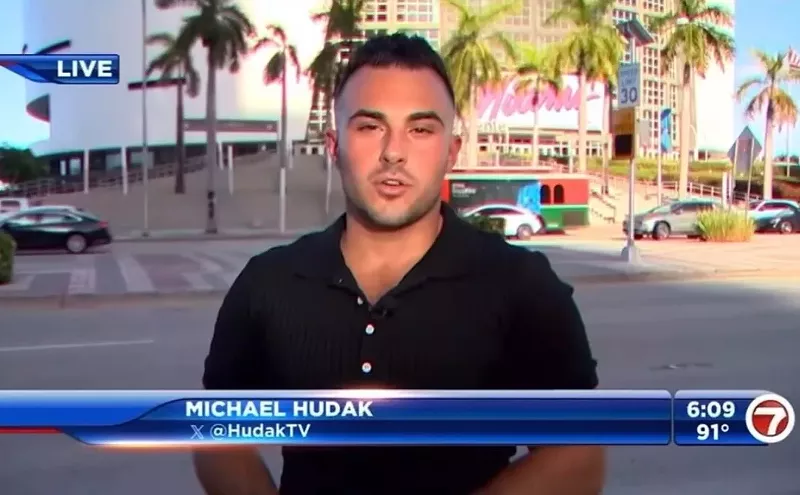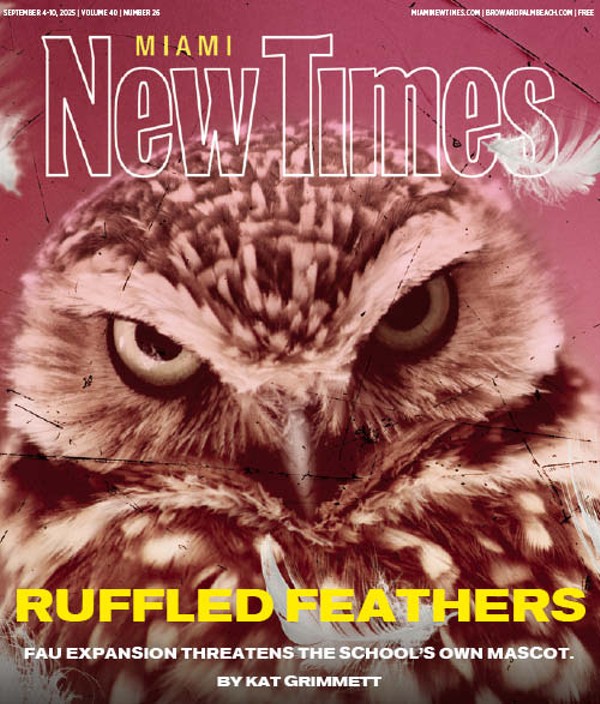The local reaction to this sea change in sentiment has been the expected circling of the wagons. No less an imposing philosophical heavyweight than pop singer Gloria Estefan finally broke her silence. After ducking the subject of Elian for months, there she was last Thursday outside the Gonzalez's Little Havana home, grabbing a bullhorn and passionately describing her own complex negotiations with Attorney General Janet Reno. Leaving aside the matter of Estefan's newly emergent legal background, a cynic might question why, if La Gloria is truly concerned with the fate of Elian (as opposed to the arc of her career), she waited so long to speak out.
Of course avid Estefan watchers know this deep commitment to social justice reaches back, oh, say, at least 24 hours: The day before Estefan was spotted on a treadmill at South Beach's XS health club. As her hulking personal bodyguard stood silently by with a bottle of water, she waved her arms in the air, and to the entire room loudly began haranguing about the fitness of Juan Miguel as a father. To be fair, though, if one is willing to read between the lines, Estefan's music has always contained lofty convictions. Witness her New Year's Eve concert, wherein she explored the existential duality of mind and spirit in the stirring "My Body Wants to Salsa," or the finely nuanced critique of urban sprawl expressed in "Miami Is a Party Town."
Musicians weren't the only ones to spring into action. We also saw the prattlings of Juan Carlos Espinosa, who, thanks to the funding largess of Jorge "Baby Mas" Santos and his Cuban American National Foundation, is just one of a growing number of right-wing ideologues masquerading as objective academics. As the assistant director of the University of Miami's Institute for Cuban and Cuban-American Studies, Espinosa is charged with producing policy reports; while these reports may have the reassuring stamp of UM, their actual credibility is on a par with the "scientific studies" commissioned by the tobacco industry: You get what you pay for.
Indeed, last November's Cuban Film Festival, cobbled together by Espinosa's institute, provided some telling insight into how that organization sees its mission. While the festival's organizers trumpeted it as representing the broad spectrum of Cuban film, only exile-produced productions actually were screened -- and even then, mostly works of facile agitprop that toed the appropriately frothing anti-Fidel line.
Accordingly, speaking to ABC news, Espinosa chalked up the current barrage of media criticism to anti-Cuban "racism," as if questioning the ludicrous posturing of Miami officials was anything but exercising common sense. While Espinosa's playing of the race card is a welcome step up from the usual ploy of labeling anyone who dissents from exile shibboleths a communist, it also serves as a sad reminder of just how debased academia in South Florida has become.
The ivory towers were hardly the only source of bizarre commentary. Take Miami Mayor Joe Carollo, who stood before a phalanx of TV cameras, and without a shred of irony declared the Cuban-American community "has no history of violence."
Hello? It's hard to imagine another community in America with a greater history of violence. How else to describe the dozens of bombings over the past three decades, all aimed at radio commentators, writers, museums, embassies, stores, and nightclubs that dared to question intransigent exile positions on U.S.-Cuba relations? When a 1992 Americas Watch report warned that "moderation can be a dangerous position," the city they were speaking of wasn't Bogotá; it was Miami. With a tip of the hat to H. Rap Brown, in our neck of the woods, violence is as Cuban as moros y cristianos.
If there's a silver lining to recent developments, it's in the forging of new links -- not only between Cuban Americans tired of having nut-job extremists speak on their behalf but also between Haitian Americans, Jamaican Americans, Latinos of all stripes, and yes, Anglos, all arriving at a common ground of disgust with the status quo.
Coalescing this anger into a united front and acting on it isn't going to be easy, but a good first step was voiced during the recent Nightline "town-hall meeting" held at Florida International University. One audience member stood up and said, "Many in the hard-line exile community want to present a picture that Miami is united in their cause. And it's not. This isn't a monolithic city." Turning to Miami-Dade Mayor Alex Penelas (already visibly squirming after being asked by Ted Koppel to repeat his "the blood will be on your hands" comments to Janet Reno's face), this same man pointedly added, "You left a lot of us feeling incredibly disenfranchised from this community, and it's going to be very, very difficult to ever forgive you for that." Amen, brother.
It says volumes about the state of rock and roll in Miami that no less a personage than Pearl Jam main man Eddie Vedder can spend an evening ponied up to the bar inside South Beach's venerable Mac's Club Deuce, and remain not just unmolested, but absolutely ignored. That was the scene two Friday evenings ago, when Sean "Birdman" Gould, producer, sound man, and keeper of the local altrock flame, looked up from his beer and spied the multiplatinum-record-holding megastar. "I thought, That looks kinda like Eddie Vedder," he recalls with a laugh. "People seemed much more interested in the six-foot-five transvestite shooting pool to his left. Nobody batted an eye at him; it was just another night at the Deuce."
As one of the few remaining relics from the Beach's preglam days, the Deuce still makes headlines more for its unrepentant skeezer vibe (vide the recent pimp vs. pimp shootout that unfolded on its doorstep) than for its VIP sightings. Adds Gould, in Vedder's nondescript T-shirt and jeans, "if he had walked down Washington Avenue, he would've been turned away at every single velvet rope."
The two soon hit it off, excitedly discussing a shared obsession with vintage Peter Townsend -- a conversation that soon led to Vedder's appearance the following night at Gould's Little Haiti warehouse space, a clubhouse-cum-recording studio that has been the site of several informal shows lately. "We just jammed all night long," enthuses Gould, likening the ramshackle session in front of two dozen invited pals to the Replacements' famed drunken cover sets of the mid '80s. "We'd do 30 seconds of the Who's 'Can't Explain' until we'd train-wreck, then go into Van Halen's 'Dance the Night Away.'... It was the most fun I've had in a long time."
The vacationing Vedder subsequently jetted up to New York City for a Pearl Jam appearance on Late Night with David Letterman, to perform a song from the group's new Binaural album. In a fitting act of symbolism, the ten minutes of the show featuring the band were pre-empted by Miami's CBS affiliate for breaking Elian coverage.
Now is a perfect time to reacquaint yourself with the cozy Alliance Cinema (927 Lincoln Rd., Miami Beach; 305-531-8504), currently showcasing several incredible films. Wrapping this week is a double feature of late '80s works from Takeshi Kitano, Violent Cop and Boiling Point, which stand as the Japanese director's wry, raised-eyebrow take on John Woo's kinetic mayhem. Also playing is Black Tar Heroin: The Dark End of the Street, a wrenching documentary that focuses on San Francisco's ongoing youth heroin epidemic; the drug currently claims almost 14,000 regular users in that city -- all with a mean age of nineteen. Amply meeting its bill as the "real-life Trainspotting," Black Tar Heroin traces the lives of five young addicts over the course of two years, free of moralizing or any other aesthetic barriers between the viewer and these subjects' painfully real lives. Largely white and lower middle class, these kids came to the Bay Area for many of the same reasons people were first drawn there en masse in the late '60s: countercultural wanderlust, a search for meaning and a remade self-identity, or pure boredom. What many of them attain is a far cry from nirvana, however: We watch them shooting up, hustling, wrestling with the day-to-day consequences of their choices, or just hanging out. Aside from being a welcome antidote to any resurgence of "heroin chic," what's particularly moving is the sense of helplessness on display here; even as one woman sighs and points to the abscesses that cover her legs (the results of accidentally injecting heroin into a muscle, since almost all available veins have collapsed), she seems powerless to envision a different path for herself.
Opening this Friday at the Alliance is trans, the debut film from Julian Goldberger shot on the fly in Fort Myers, on Florida's Gulf Coast. "If you watch Cops, chances are each week you see something shot in Fort Myers," explained Goldberger -- who grew up in that town before moving north for college -- in a recent interview. "All anyone wants to do is get wasted and kick ass. So, as a kid, you think about little else besides getting out.... That's what was so interesting about coming back to this landscape I felt so disconnected to: You can't identify with it because it doesn't have an identity."
Even though it drew raves after screenings at 1999's Sundance Film Festival (where several critics glowingly referred to it as a homegrown 400 Blows) and New York City's equally influential Museum of Modern Art New Directors showcase, as well as the fervent crusading of director Richard Linklater (Slacker, Dazed and Confused), it is only now, more than a year later, that Trans has finally landed a distributor. Despite the reams of praise, conventional industry wisdom saw Trans as "difficult," i.e., not a reliable arthouse ticket-seller. It's an attitude that dramatizes the increasingly commercial pressures on the world of independent film, once a respite from the dictates of the box office but now often just as enslaved to it. This also underlines the importance of venues like the Alliance. Rather than view the neighboring eighteen-screen Regal as a competitive threat, the Alliance has wisely chosen to see this megaplex as an opportunity. It's doubtful the South Beach Regal would have ever booked Trans, Black Tar Heroin, Violent Cop, or Boiling Point, either because of their edgy content or risky commercial prospects. Thanks to the Alliance, Miami audiences still have an opportunity to see these films. The question now is: Will those audiences show up?
Send your music news, local releases, and general gunk to Brett Sokol at 2800 Biscayne Blvd, Miami, FL 33137. Fax to 305-571-7678 or e-mail [email protected]












